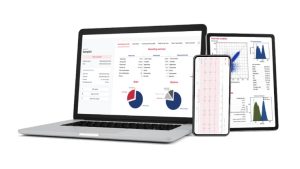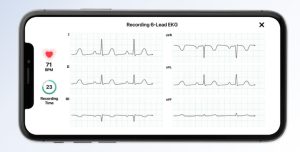ECG WITH AI
AI is transforming the field of electrocardiography (ECG), offering significant improvements in the accuracy, efficiency, and accessibility of heart health diagnostics. Here’s how AI is being used to enhance ECG technology:
1. AUTOMATED ECG INTERPRETATION:
- Rapid analysis: AI algorithms can analyze ECG data in seconds, providing quick and accurate interpretations of heart rhythms, including the detection of arrhythmias, ischemia, and other cardiac abnormalities.
- Improved accuracy: AI can detect subtle patterns in ECG signals that may be missed by the human eye, leading to more accurate diagnoses.
- Reduced workload: By automating the initial interpretation of ECGs, AI can reduce the workload of healthcare professionals, allowing them to focus on more complex cases.
2. RISK STRATIFICATION AND PREDICTION:
- Personalized risk assessment: AI can analyze ECG data along with other patient information, such as medical history and lifestyle factors, to assess the risk of future cardiovascular events.
- Early detection: AI can identify subtle changes in ECG patterns that may indicate early signs of heart disease, enabling proactive intervention.
- Predictive analytics: AI can predict the likelihood of specific cardiac events, such as heart attacks or strokes, helping healthcare providers make informed treatment decisions.
3. REMOTE MONITORING AND TELEHEALTH:
- Continuous monitoring: AI-powered ECG devices can continuously monitor patients’ heart rhythms, providing real-time data for early detection of abnormalities.
- Remote diagnosis: AI can enable remote diagnosis of heart conditions, allowing patients to receive care from anywhere in the world.
- Telehealth applications: AI-powered ECG analysis can be integrated into telehealth platforms, facilitating remote consultations and improving access to care.
EXAMPLES OF AI-POWERED ECG SOLUTIONS:
- Cardiomatics: This platform uses AI to analyze ECGs, providing automated interpretations and risk assessments for various heart conditions.
Cardiomatics ECG analysis platform

- ALIVECOR KARDIAMOBILE 6L:

- portable ECG device uses AI to detect a wide range of arrhythmias, including atrial fibrillation, bradycardia, and tachycardia
AliveCor KardiaMobile 6L ECG device
- Anumana: This AI platform analyzes ECGs to detect heart failure and other cardiac conditions with high accuracy.
Benefits of AI in ECG:
- Improved accuracy: AI can enhance the accuracy of ECG interpretation, leading to better diagnosis and treatment decisions.
- Increased efficiency: AI can automate ECG analysis, saving time and resources for healthcare professionals.
- Enhanced accessibility: AI-powered ECG devices can be used in remote settings and integrated into telehealth platforms, improving access to care.
- Early detection: AI can identify early signs of heart disease, enabling timely intervention and preventing serious complications.
- Personalized care: AI can provide personalized risk assessments and treatment recommendations, improving patient outcomes.
The Future of AI in ECG:
AI is poised to revolutionize ECG technology in the years to come. We can expect to see:
- More sophisticated AI algorithms: AI will continue to improve in its ability to detect subtle ECG abnormalities and predict future cardiac events.
- Increased integration: AI will be integrated into more ECG devices and healthcare systems, making it a standard part of cardiac care.
- Wearable ECG devices: AI-powered wearable devices will enable continuous monitoring of heart health, providing valuable data for early detection and prevention of heart disease.
By embracing AI, the field of electrocardiography can continue to advance, providing more accurate, efficient, and accessible heart health diagnostics for patients worldwide.
